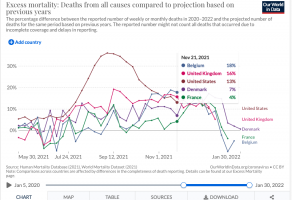Boris Sprinkler
Dont be scared
Im not denying that we got out of this well.Denmark has got through it with one of the lowest death rates in Europe ... That seems more than just spectacle.
Im saying its easy to see where conspiracy theories come from.
There was alot of unecessary spectacle. Alot of nonsensicle rules (in the begining masks had to be worn standing up on the train, or in bodegas - but could be removed if for example, you were smoking or sitting), the entire mink industry was decimated because it was found that the animals could transmit the virus. These decisions were made by politicians in whatsapp conversations which were later deleted because "security".
They had new border controls put up with the police and army working together to offload trans and check peoples papers.
A border check that never previously existed. To look for what exactly?




